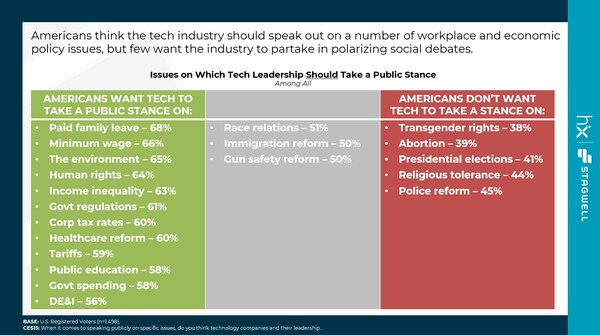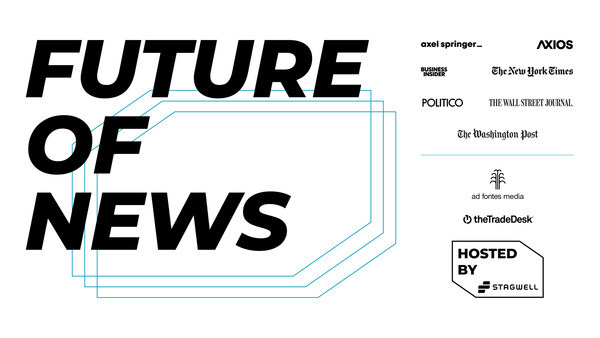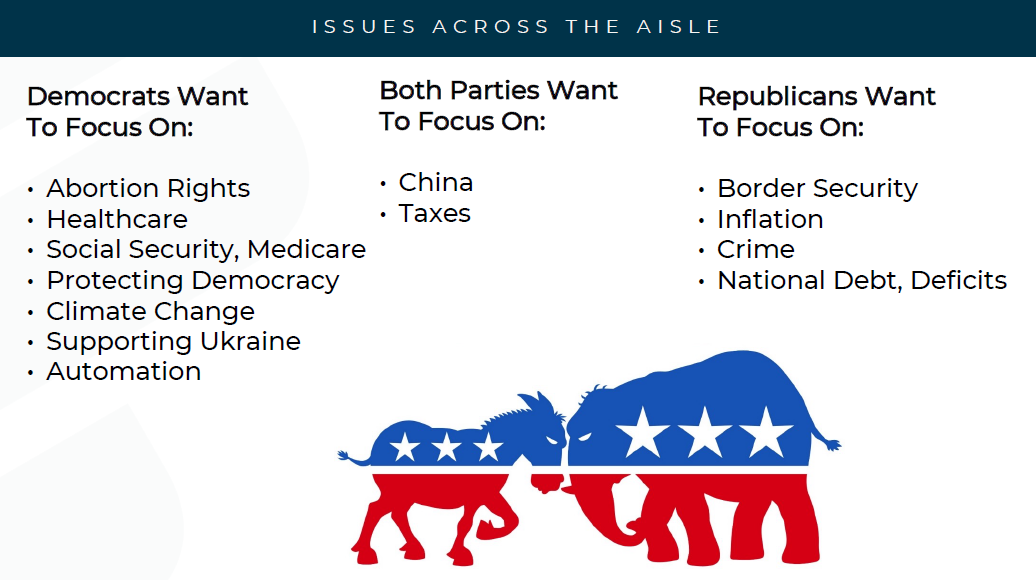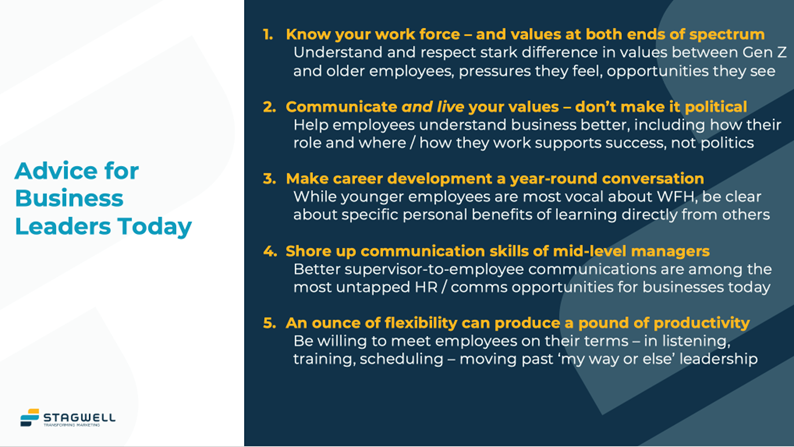General public wants tech CEOs to speak out on workplace and economic issues, but say the industry should stay clear of political and social issues
Americans think AI will have a negative impact on jobs, but few expect to be impacted directly
NEW YORK, Jan. 14, 2025 /PRNewswire/ — As the United States enters a new administration next week, Stagwell (NASDAQ: STGW) and HarrisX released a new nationwide poll showing the tech sector is entering 2025 with one of the strongest reputations across industries. The study, released during the annual CES conference, and made available online today, reveals four in five (81%) Americans view the industry favorably, placing tech on par with the manufacturing sector (80%) and far ahead of many other industries, including healthcare (65%), oil and gas (60%), pharmaceutical (52%) and news media (51%).

Nearly four in five (79%) U.S. adults say tech has a positive economic impact and 57% expect the industry to be a major economic driver over the next five years. For comparison, approximately just one in three Americans think the real estate (35%) and auto (32%) industries will play a major role in the U.S. economy.
However, while a majority of Americans (55%) want the leaders of technology companies to speak up on issues affecting industry and society, sixty percent say these leaders mostly get it wrong when they speak up. Respondents indicated that they want tech leaders to focus more on workplace and governance issues and less on divisive social and political themes.
Workplace and economic issues appear to be the safest topics for tech leaders to take a stance on. While a strong majority say tech CEOs should speak up on issues such as paid family leave (68%), minimum wage (66%) or the environment (65%), significantly fewer believe they should take a public stance on social and political issues such as transgender rights (38%), abortion (39%) or elections (41%).
“For three decades the technology sector has defined the ‘new economy’ and modern opportunities, in the process building a very strong reputation,” said Dritan Nesho, CEO of technology research firm HarrisX. “As it now embarks to once again reshape the global labor and economic landscape via A.I., Web3, and other novelties, the way tech CEOs navigate and address the impact of their innovations, and the regulations that will surely follow, will determine how the industry is perceived and treated for decades to come.”
The heads of Stagwell’s Risk and Reputation practice added their analysis on the data during a roundtable at CES.
Zac Moffatt, the CEO of Targeted Victory and the Republican co-Chair noted that “the landscape of public discourse has shifted with the 2024 presidential election, and companies need to quickly rewrite the playbook of how to engage with both the public and government over the next several years.”
Nevertheless, public sensitivities on several key themes such as the environment, human rights, income inequality, and DE&I remain strong, added Doug Thornell, CEO of SKDK, and the Democratic co-Chair, “The risk of dismissing these themes is high. The years ahead require both balance and courage.”
The Stagwell/HarrisX poll, which was conducted online January 3-6, 2024 with 1,498 registered voters, also shows that 67% of voters want tech companies to work with the incoming Trump administration. Nearly as many (58%) also believe the Trump presidency will provide a boost for the technology industry. Just 27% think tech companies will be worse off under President-elect Donald Trump.
The study also shows that as the tech industry and financial investors are doubling down on AI, Americans are less certain about its economic impact. While 60% think AI will replace more jobs than create new ones, just 30% of Americans believe AI will decrease their personal earnings in the future.
The public uncertainty towards AI is also reflected by the fact that voters are evenly divided on the approach they think the U.S. government should take in regulating the new technology. Fifty-three percent say the government should first monitor the development and implementation of AI versus 47% who say it’s better to start regulating AI right away.
In the post-election landscape, Stagwell and HarrisX are committed to helping businesses navigate the political crosshairs. For more information on how Stagwell’s Risk and Reputation Unit can help navigate the political minefield, visit https://www.stagwellglobal.com/risk-reputation-unit/.
Survey Methodology
The survey was conducted online within the United States January 3-6, 2025 among 1,498 registered voters in the United States by HarrisX. The sampling margin of error of this poll is +/-2.5 percentage points. The results reflect a nationally representative sample of registered voters. The survey sample was weighted for age, gender, region, race/ethnicity, income, and region where necessary to align it with the actual proportions in the population.
About HarrisX
HarrisX is a leading public opinion research, data analytics, and strategy consulting company with offices in the United States, United Kingdom, Canada and Singapore. HarrisX conducts multi-method research in over 50 countries around the world on behalf of Fortune 100 companies and philanthropic organizations, public policy institutions, global leaders, media and NGOs. HarrisX is a proud member of Stagwell Global (STGW). Learn more at www.harrisx.com.
About Stagwell
Stagwell is the challenger holding company built to transform marketing. We deliver scaled creative performance for the world’s most ambitious brands, connecting culture-moving creativity with leading-edge technology to harmonize the art and science of marketing. Led by entrepreneurs, our specialists in 35+ countries are unified under a single purpose: to drive effectiveness and improve business results for our clients. Join us at www.stagwellglobal.com.
Contact:
Dritan Nesho
Dritan@HarrisX.com
Related
Articles
In the News, Press Releases, Thought Leadership
Jun 10, 2025
Stagwell (STGW) Chairman and CEO Mark Penn to Discuss the Irreplaceable Power of Human Creativity on the Main Stage of Cannes Lions

Events, In the News, Press Releases, Talent & Awards
Jun 05, 2025
Code and Theory Named ANA B2B Agency of the Year After Transforming the World’s Leading Brands

In the News, Press Releases, Talent & Awards
May 19, 2025
Stagwell (STGW) Appoints Connie Chan as Chief Growth Officer for Asia Pacific

Newsletter
Sign Up
Groundbreaking 50,000-respondent survey shows ads placed adjacent to stories covering politics, inflation and crime perform as effectively as ads placed next to business, entertainment and sports stories.
Results debunk common ‘brand safety’ myths among key demographic groups for advertisers including Gen Z, affluent American households, moms and more.
NEW YORK, May 15, 2024 /PRNewswire/ — Americans are smart enough to know the difference between a news story and an ad, underscoring the current standards used for ‘brand safety’ are too broad and limit advertisers from engaging with valuable consumer audiences. This is just one of the many insights revealed in a study of 50,000 U.S. adults that Stagwell (NASDAQ: STGW) released today.
Experience the full interactive Multichannel News Release here: https://www.multivu.com/players/English/9266651-stagwell-global-future-of-news-study-advertising/
Recognizing that news is the foundation of a thriving democracy and a critical marketing vehicle, Stagwell is launching a series of ‘Future of News’ studies and events to fuel discussions on the importance of advertising in news.
Stagwell’s inaugural research for the series examines the concept of brand safety—the measures taken to ensure a brand’s advertisements don’t appear alongside content that could potentially harm that brand’s reputation. Because the current approach to brand safety disproportionately hurts the news industry, Stagwell created a study to determine the real impact of ad adjacency.
The groundbreaking survey reveals that ads placed adjacent to news topics such as politics, inflation and crime perform as effectively as those placed next to business, entertainment and sports stories.
“Our research shows brands shouldn’t fear advertising on news—but rather relish it. News junkies, who make up 25% of Americans, are one of the most valuable yet under-tapped marketing audiences,” said Mark Penn, Chairman and CEO of Stagwell. “Instead of feeding the vicious cycle of news demonetization that hurts quality journalism the most, advertisers should kickstart a virtuous cycle of investing in news that allows brands to reach valuable audiences and gives quality news content the financial stability it needs to thrive.”
Additional findings include:
- Among Gen Z, the average purchase intent for brands whose ads were placed next to high-quality news articles on the Middle East conflict was 65%, compared to 66% for inflation and 67% for crime—differences that are statistically insignificant. Purchase intent was 69% for sports (widely considered a ‘safe’ news topic) illustrating a minimal four percentage point difference between the ‘riskiest’ and ‘safest’ topics.
- Among more affluent American households, the average favorability ratings for brands whose ads were placed next to high-quality, yet political news articles on former President Trump and President Biden were each 72%—just two percentage points less than brands whose ads were placed next to a non-political entertainment story.
- Among moms, the average purchase intent for brands whose ads were placed next to articles on inflation (a potentially negative story), and business (a more neutral story) were each 70%, showing no difference between the two. Purchase intent was only two percentage points less for brands whose ads were placed next to a news story about crime with the words “subway shooting” in the title—words that get blocked as a matter of course with today’s brand safety practices.
“Brand safety considerations have become prevalent in the media and marketing industries, but they require serious scientific evaluation and more rigorous metrics to assess whether brands really face dangers from news adjacency,” said Dritan Nesho, CEO of HarrisX, which conducted the study. “Our study shows clearly and repeatedly that ads next to news content that is currently considered ‘not brand safe’ performs on par with ads next to what is currently considered ‘brand safe.'”
Stagwell is committed to initiating data-driven discussions with advertisers about their investment in news. This topic and more will be discussed at tonight’s inaugural Future of News summit which will be held at Stagwell’s global headquarters in New York.
Interested parties can request a copy of the research here. For additional questions, please contact hello@stagwellglobal.com.
Methodology
The Future of News Study was conducted among 49,990 U.S. adults from March 29 to April 19, 2024. HarrisX, a Stagwell company, conducted the quantitative survey-based online interviews. The sampling margin of error is +/-0.44% for the total study.
The survey data was weighted to a nationally representative sample of American adults across key demographics, including age, gender, region, race/ethnicity, education, income. Click here to read the full methodology.
About Stagwell
Stagwell (NASDAQ: STGW) is the challenger network built to transform marketing. We deliver scaled creative performance for the world’s most ambitious brands, connecting culture-moving creativity with leading-edge technology to harmonize the art and science of marketing. Led by entrepreneurs, our 13,000+ specialists in 34+ countries are unified under a single purpose: to drive effectiveness and improve business results for their clients. Join us at www.stagwellglobal.com.
About HarrisX
HarrisX is a leading global research consultancy that regularly conducts major market research, public policy polling and social science studies and consulting engagements in more than 40 countries around the world. It is a proud member of Stagwell Global (STGW). Learn more at www.harrisx.com.
Contact:
Kara Gelber
pr@stagwellglobal.com
Related
Articles
In the News, Press Releases, Thought Leadership
Jun 10, 2025
Stagwell (STGW) Chairman and CEO Mark Penn to Discuss the Irreplaceable Power of Human Creativity on the Main Stage of Cannes Lions

Events, In the News, Press Releases, Talent & Awards
Jun 05, 2025
Code and Theory Named ANA B2B Agency of the Year After Transforming the World’s Leading Brands

In the News, Press Releases, Talent & Awards
May 19, 2025
Stagwell (STGW) Appoints Connie Chan as Chief Growth Officer for Asia Pacific

Newsletter
Sign Up
“Stories from the Field” newsmaker panel to feature Hannah Beckler (Business Insider), Jason Conti (Dow Jones), Jason Rezaian (The Washington Post) and Megan Twohey (The New York Times)
“Why News Works for Brands” panel to include Tara Carraro (U.S. Steel), Will Doherty (The Trade Desk), Dan Gardner (Code and Theory), Shenan Reed (General Motors) and Lou Paskalis (Ad Fontes Media)
NEW YORK, April 30, 2024 /PRNewswire/ — Stagwell (NASDAQ: STGW) today announced the speakers for its inaugural Future of News summit on May 15, 2024 which will be held at Stagwell’s global headquarters at One World Trade Center in New York.
During the event, Stagwell will unveil groundbreaking research, conducted by HarrisX, debunking misconceptions about brand safety in news contexts, and challenge advertisers to reassess investment in news publishers – an essential step in ensuring a thriving future for the news industry.

This summit also marks an occasion to formally debut Stagwell’s new partnership council of U.S. publishers, media buying platforms and social platforms, including Ad Fontes Media, Axel Springer, Axios, Business Insider, POLITICO, The New York Times, The Trade Desk, The Wall Street Journal and The Washington Post. Together, the council will launch a transformative platform to challenge the advertising industry to reinvest in news.
“The Future of News Summit will reframe the conversation by debuting research that illustrates the power of news audiences to drive business and debunks common brand safety myths,” said Stagwell Chairman and CEO Mark Penn. “According to our prior research, 90% of voters think the country should have freedom of the press, and yet news monetization is increasingly under attack. Live at the summit we’ll bring both brand and publisher partners together to discuss ways to navigate this climate and maintain consumer trust.”
Penn will kickoff the program and reveal key findings from the research, followed by two panel discussions featuring journalists and brand leaders who see news as the foundation of a thriving democracy and a critical vehicle for marketing ROI.
Panel I: Being A Journalist Today – Stories from the Field: A moderated conversation about the journalists today who are breaking down barriers, holding truth to power, and shining a light on the issues that matter most- despite the most difficult and dangerous of circumstances, featuring:
- Hannah Beckler, Business Insider: Beckler is the Senior Editor, Investigations at Business Insider. Most recently, she reported on the eight US state prison systems that deploy patrol dogs to attack and terrorize incarcerated people, for which she received a National Magazine Award.
- Jason Conti, Dow Jones: Conti is the EVP and General Counsel at Dow Jones, publisher of The Wall Street Journal. As general counsel, he oversees the company’s legal department. Conti also leads the company’s legal efforts to secure the release of WSJ reporter Evan Gershkovich, who has been wrongfully detained in Russia for over a year.
- Jason Rezaian, The Washington Post: Rezaian is a writer for Global Opinions. He served as The Post’s correspondent in Tehran from 2012 to 2016. He spent 544 days unjustly imprisoned by Iranian authorities until his release in January 2016. He is a CNN contributor.
- Megan Twohey, The New York Times: Twohey is an investigative reporter at The New York Times whose work has prompted changes to the law, criminal convictions and cultural shifts. Twohey is most known for being one of the journalists who broke the story of Hollywood producer Harvey Weinstein’s long pattern of sexual harassment and abuse, which helped ignite the #MeToo movement and shared in the Pulitzer Prize for Public Service.
- Moderated by Ray Day, Stagwell Vice Chair
Panel II: Why News Works for Brands: Investment in advertising on news platforms is not only brand safe, but also lends itself to a strong return on investment. This session will be an interactive dialogue with business leaders sharing their perspectives on the value of news and how to maximize impact through tailored marketing, featuring:
- Tara Carraro, U.S. Steel: Tara Carraro serves as Senior Vice President and Chief Communications Officer for U. S. Steel where she is responsible for reputation management and communications strategies designed to help deliver on its Best for All® strategy. She also has executive responsibility for Community Relations and non-governmental Stakeholder Engagement.
- Will Doherty, The Trade Desk: Doherty is the Vice President of Inventory Development at The Trade Desk where he oversees strategic partnerships with publishers which includes legacy media, television networks as well as new and emerging channels. Doherty has been responsible for launching products including OpenPath and championing Unified ID 2.0 amongst the publisher side of digital media.
- Dan Gardner, Code and Theory: Gardner is co-founder of the technology-first creative agency Code and Theory and ON_Discourse, a new membership media company focused on the business of technology, prioritizing expert-driven discourse to drive perspectives.
- Shenan Reed, General Motors: Reed is the Global Chief Media Officer at General Motors. She comes to the automaker following three-and-a-half years as SVP, Head of Media at L’Oréal USA and 20+ years of media agency experience.
- Moderated by Lou Paskalis, Ad Fontes Chief Strategy Officer
Interested parties can request a copy of the research here. For additional questions, please contact hello@stagwellglobal.com
About Stagwell
Stagwell (NASDAQ: STGW) is the challenger network built to transform marketing. We deliver scaled creative performance for the world’s most ambitious brands, connecting culture-moving creativity with leading-edge technology to harmonize the art and science of marketing. Led by entrepreneurs, our 13,000+ specialists in 34+ countries are unified under a single purpose: to drive effectiveness and improve business results for their clients. Join us at www.stagwellglobal.com.
About HarrisX
HarrisX is a leading global research consultancy that regularly conducts major market research, public policy polling and social science studies and consulting engagements in more than 40 countries around the world. It is a proud member of Stagwell Global (STGW). Learn more at www.harrisx.com.
Related
Articles
In the News, Press Releases, Thought Leadership
Jun 10, 2025
Stagwell (STGW) Chairman and CEO Mark Penn to Discuss the Irreplaceable Power of Human Creativity on the Main Stage of Cannes Lions

Events, In the News, Press Releases, Talent & Awards
Jun 05, 2025
Code and Theory Named ANA B2B Agency of the Year After Transforming the World’s Leading Brands

In the News, Press Releases, Talent & Awards
May 19, 2025
Stagwell (STGW) Appoints Connie Chan as Chief Growth Officer for Asia Pacific

Newsletter
Sign Up
By
Stagwell’s Risk and Reputation Unit
Welcome to the RiskRep Radar, a newsletter from Stagwell’s Risk and Reputation Unit on what companies and business leaders need to know about the intersection of business and politics.

How business is a key election issue
For the first time in decades, immigration is the number one concern for voters, according to the latest Harvard CAPS-Harris poll. Yet, when asked what issue matters most to voters personally, every demographic group picks inflation and cost increases.
This focus will bring business into the crossfire. With Donald Trump’s tax cuts set to expire next year, CEO pay and corporate taxes will become key talking points for both campaigns. With abortion rights rising to the fore again following Arizona’s recent Supreme Court decision, corporate health care policies could come under increased scrutiny, especially by political candidates looking to drum up outrage.
Equally, businesses with strong ties to China could come under fire.
Based on Stagwell’s experts working inside all the campaigns, Democrats and Republicans will be running hard on the following issues:

A battle of generations, not just parties
Age, not just than partisanship, also is behind several of the issues dividing Americans today. Gen Z is by far the most comfortable with employee activism, and tensions over Israel-Hamas continue to spill into the workplace. Google just fired 28 workers for participating in protests over its Israel contract. Universities have faced most of the criticism from politicians so far, but companies should be ready to be next.
The same pattern is emerging around TikTok. While roughly two thirds of Democrats, Republicans and Independents support a TikTok ban, there’s a wide difference by age. Gen Z (18-24-year-olds) is the only age group to oppose a TikTok ban (57%). At the other end, 84% of those 65 and older support the ban.
Key markets will be swamped with ads creating a negative communications environment
Stagwell’s omnichannel agency Assembly projects a record $12 billion will be spent across media channels this election cycle year. This spending will be highly targeted and concentrated in key markets.
Las Vegas, Philadelphia, Phoenix and Reno will be bombarded the most, followed by Pittsburgh, Tucson, Missoula, Billings, Boston, Wilkes Barre-Scranton, Butte-Bozeman, Detroit, Los Angeles, Charlotte, Atlanta, Cleveland, Cincinnati, Harrisburg, D.C. and Raleigh-Durham.
Importantly, as the election ads heat up, these markets will be inundated with nearly complete negativity – which will make communicating and marketing more difficult than ever. Specifically, negative advertising about the economy could not just affect people’s votes; it could depress their willingness to spend.
It is more important than ever for business leaders to be prepared for this election cycle with bipartisan advisory teams, integrated vetting processes, scenario planning and 24/7 monitoring.
Explore our full presentation on the issues driving the 2024 campaigns here.
ICYMI: Risk and Reputation Unit in the News
Related
Articles
Artificial Intelligence, In the News, Marketing Frontiers, Press Releases, Stagwell Marketing Cloud, Tech
Jun 12, 2025
PRophet, a Stagwell (STGW) Company, Completes Integration of UNICEPTA, Launches Unified Brand and Enhanced Media Intelligence Offering

In the News, Marketing Frontiers, Press Releases, Stagwell Marketing Cloud, Tech
Jun 11, 2025
The Marketing Cloud Launches Cutting-Edge Platform to Simplify Marketing Workflows

In the News, Press Releases, Thought Leadership
Jun 10, 2025
Stagwell (STGW) Chairman and CEO Mark Penn to Discuss the Irreplaceable Power of Human Creativity on the Main Stage of Cannes Lions

Newsletter
Sign Up
By
Stagwell’s Risk and Reputation Unit
Welcome to the RiskRep Radar, an every-other-week newsletter from Stagwell’s Risk and Reputation Unit on what companies and business leaders need to know about the intersection of business and politics.

During COVID, businesses innovated and listened in warp speed. Leaders today need to do so again to create the next chapter of employee engagement and communications, while addressing diverging demographics and values about the future of work.
A Difference in Values and Diverging Demographics Are Causing WFH Culture War
Four years into the work-from-home experiment, the culture war is in full swing. Where you work has become a partisan issue.
Democrats are more likely than Republicans to say remote work is good for employee wellbeing (+13 percentage points), company bottom lines (+15 percentage points) and career advancement (+16 percentage points).
Republicans are more likely to say that it’s frustrating to hear complaints about in-person work when so many frontline workers do it daily (+9 percentage points); and that work has traditionally been “in-person” and that’s how it should be (+10 percentage points).
WFH is also a battle of generations. Millennials, along with Gen Z, are leading the WFH narrative and believe they have leverage over employers. In fact, 71% of Millennials believe they could readily seek out a job with higher pay. At the same time, Gen Z has a steep learning curve that WFH is not helping: 82% of managers say new Gen Z hires’ soft skills need more development.
What the Future of Work Looks Like Now That Everything’s Politicized
Americans increasingly care more about quality of life than simply climbing the corporate ladder. Employees’ top 2 priorities are to “build financial stability so I can pursue what I care more about” (37%) and to “establish a better work life balance” (35%).
Younger workers also believe businesses have broken promises made to them during COVID. That includes 67% of Millennials and 54% of workers overall who say they were promised better work-life balance that never happened. And it’s not just young people who prioritize “work to live” versus “live to work.” Of all American workers, 78% say they would be more loyal to a company that gave employees the freedom to choose where they work from.
What Business Leaders Should Do
To start, business leaders need to modernize employee communications and engagement. In most companies, more than 70% of employees want clearer views of company strategy. Half of employees want more focus on operational changes and organizational goals rather than macro news and generic business updates. In short, employees want more context.
In addition:

Explore the full presentation on the politicization of return to office here.
Mark Your Calendar: April Webinar on Cybersecurity
Our next 30-minute, free risk-and-reputation webinar is at noon ET Thursday, April 18. Together with Stagwell’s communications firm Allison, we will focus on how business leaders can build and protect reputations in the era of cyberwarfare and misinformation. To RSVP, email Alexis Williams.
ICYMI: Risk and Reputation Unit in the News
Related
Articles
Artificial Intelligence, In the News, Marketing Frontiers, Press Releases, Stagwell Marketing Cloud, Tech
Jun 12, 2025
PRophet, a Stagwell (STGW) Company, Completes Integration of UNICEPTA, Launches Unified Brand and Enhanced Media Intelligence Offering

In the News, Marketing Frontiers, Press Releases, Stagwell Marketing Cloud, Tech
Jun 11, 2025
The Marketing Cloud Launches Cutting-Edge Platform to Simplify Marketing Workflows

In the News, Press Releases, Thought Leadership
Jun 10, 2025
Stagwell (STGW) Chairman and CEO Mark Penn to Discuss the Irreplaceable Power of Human Creativity on the Main Stage of Cannes Lions

Newsletter
Sign Up
By
Stagwell’s Risk and Reputation Unit
Welcome to the RiskRep Radar, an every-other-week newsletter from Stagwell’s Risk and Reputation Unit on what companies and business leaders need to know about the intersection of business and politics.

Acronyms Are Even More Polarizing
ESG and DEI continue to come under fire, confuse Americans and cause trouble for businesses using the terms. ESG is up 13 points in negativity, and DEI is up 11 points since December, based on Harris Poll data.
Some Americans feel negatively about DEI because they think “it prioritizes identity over merit,” according to the Harris Poll. They feel negatively about ESG because “it’s used by companies to improve their public image rather than genuine commitment to social and environmental responsibility.”
The problem with ESG and DEI is the acronym, however – not the concepts themselves.
Americans Agree with the Value behind DEI and ESG
81% of Americans agree that corporate America should reflect the diversity of the American population, and 78% agree that it should reflect racial diversity, according to a Harris Poll study with the Black Economic Alliance. Also, 79% of Americans think having more diverse leaders would allow for better outcomes in government, business and overall innovation.
The same is true for ESG: 52% say a brand’s sustainability efforts affect their purchase decisions, according to Stagwell’s National Research Group’s data. Gen Z and Millennials, in particular, believe sustainability needs to come from the top and be established by policymakers and big-company leaders.
“Equality” is 15 points less divisive than DEI. Similarly, “sustainability” is 24 points less divisive than ESG.
Case in point: BlackRock, the original champion of ESG, just announced a pivot to “transition investing.”
New News: IVF Is the Latest Divisive Acronym
In light of the Alabama Supreme Court’s decision jeopardizing IVF in the state, our latest Harris Poll data show the term “IVF” (in-vitro fertilization) is polarizing to 53% of Americans. This is despite the fact that 90% of those familiar with the concept believe people should have access to IVF to try having a baby.
Again, it’s the acronym versus the concept that is confusing and polarizing to many Americans.
March Webinar: The Politicization of Return to Work
Our next 30-minute, free risk-and-reputation webinar is at noon ET Thursday, March 21. This month, we focus on the politicization of return to work – including new data showing three in four Americans believe remote work has become unnecessarily politicized and 57% of companies are out of touch based on their policies. To RSVP, email Alexis Williams.
ICYMI: Risk and Reputation Unit in the News
Related
Articles
Artificial Intelligence, In the News, Marketing Frontiers, Press Releases, Stagwell Marketing Cloud, Tech
Jun 12, 2025
PRophet, a Stagwell (STGW) Company, Completes Integration of UNICEPTA, Launches Unified Brand and Enhanced Media Intelligence Offering

In the News, Marketing Frontiers, Press Releases, Stagwell Marketing Cloud, Tech
Jun 11, 2025
The Marketing Cloud Launches Cutting-Edge Platform to Simplify Marketing Workflows

In the News, Press Releases, Thought Leadership
Jun 10, 2025
Stagwell (STGW) Chairman and CEO Mark Penn to Discuss the Irreplaceable Power of Human Creativity on the Main Stage of Cannes Lions

Newsletter
Sign Up
By
Stagwell’s Risk and Reputation Unit
Welcome to the RiskRep Radar, an every-other-week newsletter from Stagwell’s Risk and Reputation Unit leaders on what brands need to know about the intersection of business and politics. Every edition features key data and news roundups with early access to Risk and Rep Unit-led polling.

Americans Trust Local Institutions More than National Ones
American institutions, especially at the national level, are facing a huge deficit of trust. Harris Poll data show people get increasingly suspicious of those outside their own community:
- My friends/family: 84% trust information from this source
- Local TV news: 65%
- Local newspapers and news websites: 62%
- National newspapers and news websites: 55%
- National TV news: 55%
- Local political leaders: 50%
- National political leaders: 41%
- Social media: 35%
Americans of All Ages Use Social Media for News But Don’t Trust It
While 65% of Americans do not think social media is a trusted source of news, 66% have used social media to seek out news, according to the Harris Poll.
And it’s not just young people: 82% of Gen Z, 78% of Millennials, 72% of Gen X and 44% of Boomers and older have used social media for news.
Nor is it partisan: 67% of Democrats, 66% of Republicans and 66% of Independents have used social media for news.
Yet everyone isn’t seeing the same social media. What makes the situation even more challenging is that people live in their own news bubbles – and their own brand bubbles, too.
In the News: Social Media Platforms’ Trust and Safety Struggles
Social media CEOs from Meta, TikTok, X, Snap and Discord were in the hot seat last week for a contentious Senate Judiciary hearing about online child safety. The CEOs tried to highlight the resources their companies are directing towards monitoring and prevention, but public trust remains low.
While backlash against tech companies for their struggles on child safety comes from both sides of the aisle, the criticism around tech companies’ content moderation policies is increasingly partisan. Meta is now the poster child for what we call the “Crisis L,” a new risk pattern in which a politically driven crisis causes major reputation damage to a company with no evidence of recovery.
In 2019, after the Cambridge Analytica scandal, Meta’s reputation score dropped from the mid-70s to 58.3, into the Poor tier, and it still sits at 59.7 as of 2023. Meta is now the seventh most polarized company on the Axios Harris 100 with a 12.7-point gap between Democrat and Republican scores.
Brands cannot expect reputation recovery when half the country feels alienated from them politically.
Mark Your Calendar: February Risk & Rep Webinar
In addition to our biweekly newsletters, stay tuned for our monthly webinar series: 30-minute deep dives for communication leaders into key topics from employee activists to misinformation to geopolitics.
To RSVP to our first webinar on Thursday, February 22, 12:00-12:30 pm EST, email Alexis Williams.
ICYMI: Risk and Reputation Unit in the News
Related
Articles
Artificial Intelligence, In the News, Marketing Frontiers, Press Releases, Stagwell Marketing Cloud, Tech
Jun 12, 2025
PRophet, a Stagwell (STGW) Company, Completes Integration of UNICEPTA, Launches Unified Brand and Enhanced Media Intelligence Offering

In the News, Marketing Frontiers, Press Releases, Stagwell Marketing Cloud, Tech
Jun 11, 2025
The Marketing Cloud Launches Cutting-Edge Platform to Simplify Marketing Workflows

In the News, Press Releases, Thought Leadership
Jun 10, 2025
Stagwell (STGW) Chairman and CEO Mark Penn to Discuss the Irreplaceable Power of Human Creativity on the Main Stage of Cannes Lions

Newsletter
Sign Up
By
Stagwell’s Risk and Reputation Unit
Welcome to the RiskRep Radar, a biweekly newsletter from Stagwell’s Risk and Reputation Unit leaders on what brands need to know at the intersection of business and politics. Every edition will feature key data and news roundups with early access to Risk and Rep Unit-led polling when available.

Live from CES: When Should Brands Speak Out?
The pendulum has swung back around. Five years ago, brands were encouraged to speak out a lot, but now C-suites are asking whether they should retrench and stay out of politics.
Ray Day and John Gerzema from the Risk and Reputation Unit were at CES 2024 talking to CCOs about how companies should navigate the political cycle, stick to their values and avoid dividing their audience. Watch their Content Studio interview for their advice.
Toxic Words and Acronyms
Words matter and today acronyms are the main troublemakers. That’s according to the Harris Poll’s first-of-its-kind assessment of the most commonly used words in business and not what they mean, but how they’re interpreted. Highlights from the results, which were featured in Axios Communicators:
- 49% of Americans find “ESG” a divisive term
- 38% find “DEI” divisive
- ESG is nearly twice as polarizing a term as “sustainability”
- The top three most divisive terms were “cancel culture” (78%), “woke” (66%) and “underrepresented” (62%)
The key takeaway: Businesses should remain committed to diversity efforts, which other Harris Poll data shows commands overwhelming support – but avoid the acronyms, which have become overly politicized.
Reputation Case Study: Boeing’s Latest Mishap
Stagwell CEO Mark Penn’s Harvard Business Review piece last month dove into the increasing severity of corporate crises that are centered on politics rather than competence or governance issues. That article featured Boeing as a company that successfully navigated the Crisis U: its reputation took a hit after multiple 737 Max crashes, but it recovered within 2-3 years by proving its core competency. Now after the terrifying 737 Max 9 incident earlier this month, Boeing will have to win back people’s trust all over again.
Mark Your Calendar: February Risk & Rep Webinar
The Risk and Reputation Unit will be releasing a steady stream of content throughout 2024 to prepare brands for the contentious election cycle. In addition to our biweekly newsletters, stay tuned for our monthly webinar series: 30-minute deep dives for communication leaders into key topics from employee activists to misinformation to geopolitics.
To RSVP to our first webinar on Thursday, February 22, 12:00-12:30 pm EST, email Alexis Williams.
ICYMI: Risk and Reputation Unit in the News
Related
Articles
Artificial Intelligence, In the News, Marketing Frontiers, Press Releases, Stagwell Marketing Cloud, Tech
Jun 12, 2025
PRophet, a Stagwell (STGW) Company, Completes Integration of UNICEPTA, Launches Unified Brand and Enhanced Media Intelligence Offering

In the News, Marketing Frontiers, Press Releases, Stagwell Marketing Cloud, Tech
Jun 11, 2025
The Marketing Cloud Launches Cutting-Edge Platform to Simplify Marketing Workflows

In the News, Press Releases, Thought Leadership
Jun 10, 2025
Stagwell (STGW) Chairman and CEO Mark Penn to Discuss the Irreplaceable Power of Human Creativity on the Main Stage of Cannes Lions

